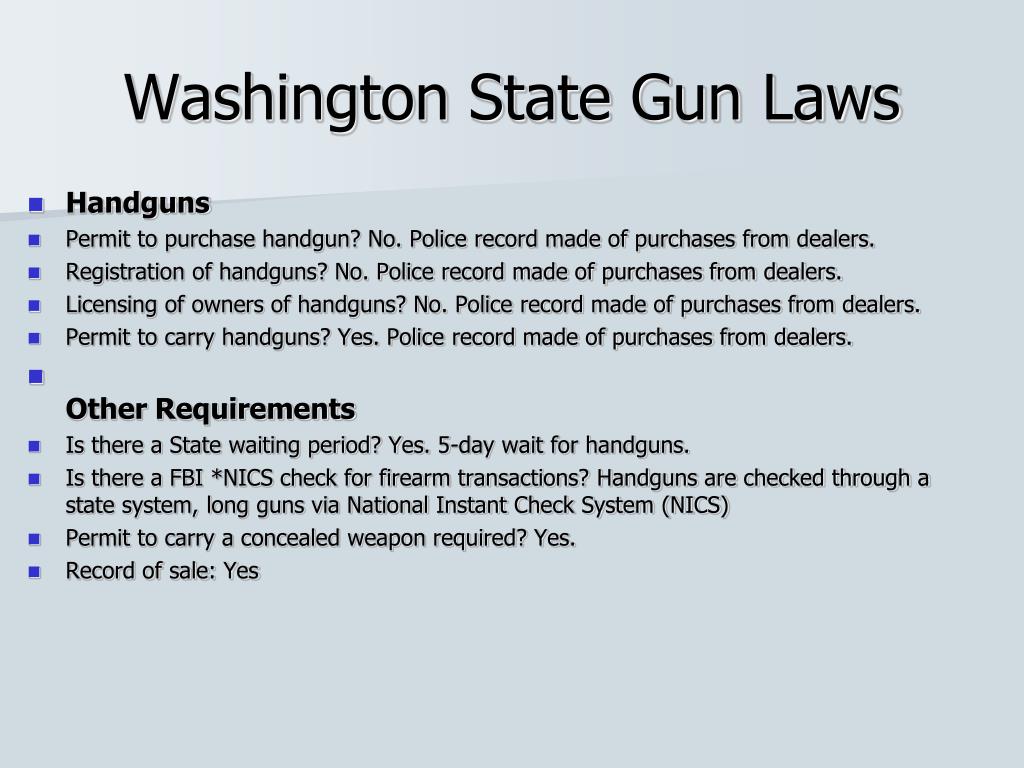Understanding Gun Laws in Washington State

Background Checks and Waiting Periods
One of the key features of Washington's gun laws is the requirement for background checks and waiting periods before purchasing a firearm. Anyone who wishes to buy a gun must undergo a background check, which includes a review of criminal records and mental health history. This process helps to prevent guns from falling into the hands of individuals who pose a risk to themselves or others.
Background Checks
Background checks are conducted by licensed firearms dealers, who are required to maintain records of all sales and transfers. The background check process is quick and easy, and most checks are completed within minutes. However, if there is a delay or additional review is required, the waiting period can extend up to 10 days.
Waiting Periods
Washington also has a mandatory waiting period for handgun purchases. This waiting period allows time for the background check to be completed and for any potential red flags to be identified. The waiting period is three days for handguns and does not apply to long guns or rifles.
Concealed Carry Permits
In Washington State, it is legal to carry a concealed firearm with a permit. To obtain a concealed carry permit, individuals must complete a firearms safety course and pass a background check. Once issued, the permit is valid for five years and must be renewed before it expires.
Open Carry
Washington also allows open carry of firearms without a permit. However, there are restrictions on where you can carry a firearm, including in schools, government buildings, and certain public areas. It's important to familiarize yourself with these restrictions to avoid violating the law.
Firearms in Public Places
Washington State has strict laws regarding the possession of firearms in public places. It is illegal to carry a firearm in any location where alcohol is served, including bars and restaurants. It is also illegal to carry a firearm within 1,000 feet of a school, unless you have a concealed carry permit.
Gun-Free Zones
Washington also designates certain areas as "gun-free zones," where firearms are prohibited. These include schools, courthouses, and public parks. Violating these restrictions can result in fines, imprisonment, or both.
Pros and Cons of Gun Laws in Washington State
Like any set of laws, there are pros and cons to Washington's gun laws. Some argue that these laws infringe on their Second Amendment rights and make it more difficult for law-abiding citizens to purchase and carry firearms. Others believe that these laws are necessary to promote public safety and reduce gun violence.
Pros
- Background checks help to keep guns out of the hands of criminals and individuals with mental health issues
- Waiting periods provide time for additional review and prevent impulsive purchases
- Concealed carry permits ensure that gun owners are properly trained and vetted
- Gun-free zones promote public safety in sensitive areas
Cons
- Gun laws can be complex and confusing for law-abiding citizens to navigate
- Some argue that these laws infringe on their Second Amendment rights
- Illegal firearms may still find their way into the hands of criminals and pose a threat to public safety
- Gun-free zones may create a false sense of security and make individuals more vulnerable to attacks
FAQs
Q: Can I purchase a firearm in Washington without a background check?
A: No. All firearms purchases in Washington require a background check, regardless of whether the sale is conducted by a licensed dealer or a private party.
Q: Can I carry a concealed firearm in Washington without a permit?
A: No. You must have a concealed carry permit to legally carry a concealed firearm in Washington.
Q: Can I carry a firearm in a national park in Washington?
A: Yes. However, you must comply with all federal and state laws regarding the possession and use of firearms in national parks.
Q: Can I sell a firearm to a private party in Washington without a background check?
A: No. All firearms sales in Washington, including private party sales, require a background check.
